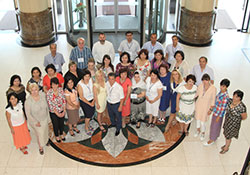Subregional training course for the central Asian republics on public health leadership

WHO
WHO/Europe organized a subregional training course on public health leadership for the central Asian republics on 15–18 June 2015 in Tashkent, Uzbekistan. The course was provided by WHO/Europe's Division of Health Systems and Public Health and hosted by the Government of Uzbekistan. It brought together 30 participants from the 4 central Asian republics – Kazakhstan, Kyrgyzstan, Tajikistan and Uzbekistan – and the Russian Federation. Participants included mid-to-senior-level public health policy-makers, administrators, public health programme managers and representatives of public health institutions.
About the course
The course provided a platform to present and discuss the most recent evidence and the challenges and opportunities in public health leadership across the WHO European Region and globally, taking particular account of the context of the central Asian republics. The training aimed at improving understanding of practical leadership approaches and leadership systems and mechanisms in the context of Health 2020. The course upheld a vision of cross-sectoral collaboration, drawing on experience within and beyond the health sector; supporting practical skills to public health leadership; and fostering exchange and networking on public health leadership among colleagues in the central Asian republics. Following the course, organizers offered individual coaching sessions to help further promote quality health leadership.
Feedback from course directors
"One participant wanted to find new friends to extend his personal network of leaders. Another felt that the course helped to bring a fence down and that it enabled her to feel like a citizen of this world. We could see that participants demonstrated great personal progress in their thinking and the development of their own leadership knowledge and skills through the course of the programme. But within WHO, we, too, learned about the assets and challenges for public health leadership in this part of our Region," said Dr Elke Jakubowski, Programme Manager, Public Health Services, WHO/Europe.
"The subregional training course for the central Asian republics was a timely and adequate response to the pressing need to develop public health leaders who will be able to solve wicked public health problems in the region. Through the innovative, interdisciplinary, inter-professional and transformative approach to leadership training, the participants, trainers and WHO colleagues worked together to shape the new understanding of public health leadership. The new model of collaborative, horizontal, adaptive and servant leadership helped change the traditional mindset and brought the understanding that leadership is the process which starts from within us," commented Dr Katarzyna Czabanowska, Associate Professor, Department of International Health, Maastricht University, the Netherlands.
"Working on the development and delivery of this public health leadership course has been a fantastic personal opportunity and brought me great learning insights. Prior to the start of the course, our aim was to make it as interactive and participatory as we could; however, I worried that the participants may not be ready for open, honest, interactive dialogue about their organizational and personal issues. What a great surprise to find that right from the very beginning, everyone in the room made a tremendous effort to add their own contributions, to interact, build relationships and share both their achievements and challenges. It was a privilege and pleasure to be invited on behalf of Durham University to contribute to this endeavour," added Dr Catherine Hannaway, Programme Director, Leadership Programmes in Centre for Public Policy & Health and Senior Fellow, Durham University, United Kingdom.
"The course gave a unique opportunity to look into the window of professional public health life in the region of central Asia and learn about the energy, dynamics and aspirations from the local leaders. The great enthusiasm of the participants and course leaders created an unforgettable environment and became a starting point for a number of initiatives for further development," said Dr Elena Varavikova, MD, PhD, MPH, Leading Researcher, Research Institute for Health Information and Informatics, Moscow, Russian Federation.



